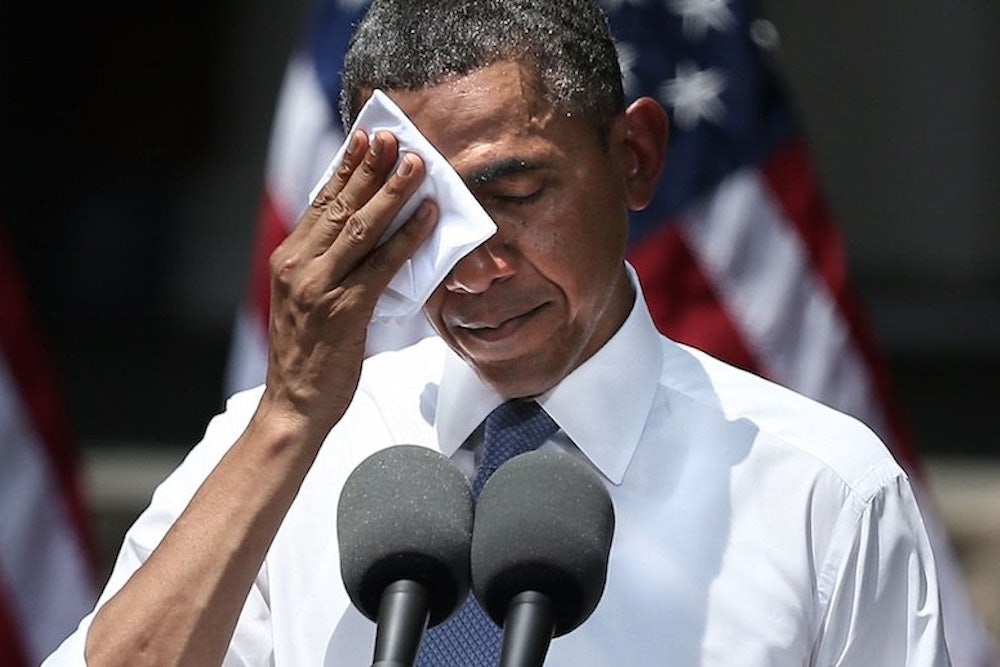In speaking about climate change, President Barack Obama has a certain rhetorical tic that's starting to wear thin. “We can’t attribute any particular weather event to climate change," he said a few weeks after Hurricane Sandy in 2012. “We know that no single weather event is caused solely by climate change,” he said in a 2013 speech unveiling his Climate Action Plan. And he employed that disclaimer again in a speech this month about his plan to cut carbon pollution: “While we can't say any single weather event is entirely caused by climate change...”
This is true, as far as scientists understand extreme weather today. But Obama should stop saying it, because it's irrelevant to his argument.
While climate change didn't necessarily cause Superstorm Sandy or, say, the April 2011 tornado outbreak, the scientific consensus is that climate change exacerbates certain extreme weather. The latest evidence arrived Thursday in a Geophysical Research Letters paper, which concluded that warming temperatures were the second leading factor in California’s unrelenting four-year drought, behind natural variability in wind speed, precipitation, and temperature. The authors say that warming made the drought anywhere from 8 to 27 percent more severe. That might not sound like a lot, but project out that conclusion to 50 years from now: California is likely to face a permanent state of drought.
Warming means the atmosphere can hold more moisture, or “demand” it, from soils and ecosystems. The lead author of the paper, Columbia University climate scientist A. Park Williams, compared climate change to a bully.
“I was thinking of a bully at school who steals lunch money every day and keeps demanding more and more,” he said in an email. “His victims may not think it’s too big of a deal when they have a lot of extra money (or water) lying around, but the demands make things tough when money (or water) is already limited. As the bully’s demands grow more bold, the tough times get tougher and the surpluses during good times become smaller.”
“While man-made climate change may increase or decrease the odds of certain weather events," he continued, "we generally cannot say that a given event is entirely caused by climate change. What climate scientists have been able to do often times is use climate models to come up with an estimation of how climate change has influenced the probability of certain events.”
The scientific evidence on this front is developing, and for now there's still debate over how much climate change is to blame for specific extreme weather events. The Intergovernmental Panel on Climate Change, an international body of climate scientists, has looked at overall trends, though. It found that scientists are "virtually certain" that anthropogenic warming will mean more hot days by the end of the century, and parts of the Earth will probably also see more intense deluges, drought, and cyclones.
As atmospheric scientist Kevin Trenberth put it in a Climatic Change paper in 2012:
Scientists are frequently asked about an event “Is it caused by climate change?” The answer is that no events are “caused by climate change” or global warming, but all events have a contribution. Moreover, a small shift in the mean can still lead to very large percentage changes in extremes. In reality the wrong question is being asked: the question is poorly posed and has no satisfactory answer. The answer is that all weather events are affected by climate change because the environment in which they occur is warmer and moister than it used to be.
No doubt Obama, and the Democratic lawmakers who echo him, issue their climate-change disclaimer about specific weather events so that they can't be accused by Republicans of "politicizing" natural disasters. But there’s nothing political about this; rather, it's completely fair to discuss the overall trend. Obama would do better to emulate fellow Democrat Jerry Brown: Visiting a site burned by the Rocky Fire, the California governor said, “While we’ve had droughts in the past historically, we haven’t had drought with this elevated temperature.”
So when Obama says, as he did in his speech this month, that "we've seen stronger storms, deeper droughts, longer wildfire seasons," he should leave the disclaimer out of it. We have indeed seen stronger storms, deeper droughts, longer wildfire seasons—and yes, climate change is an essential part of the conversation.
